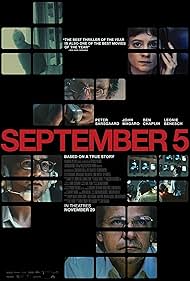Greetings from the darkness again
During the 1972 Summer Olympics in Munich, an American sports broadcast crew must adjust to live coverage of Israeli athletes held hostage by a terrorist group. The year 1972 is remembered for several highlights. Swimmer Mark Spitz set seven world records on his way to seven gold medals. Belarusian gymnast Olga Korbut won three gold medals (though not in the all-around). The United States and Russia played one of the strangest and most controversial Games in Olympic history.
These games took place just 27 years after the end of World War II
And most importantly, the 1972 Munich Olympics is remembered for the tragedy surrounding the hostage-taking of 10 members of the Israeli team by a masked Palestinian militant group. Writer-director Tim Fehlbaum and co-writers Moritz Binder and Alex David recreate the events from the perspective of the ABC television production team. From a historical perspective, these were the first Olympic Games with widespread and comprehensive live television coverage. They were also the first Olympic Games in Germany since 1936 (the Jesse Owens’ Games). A quick calculation shows us that 27 years after the release of this film have passed in 1997, the year Princess Diana died.
New broadcast producer Geoffrey Mason (John Magaro, PAST LIVES, 2023) is brought in to run the “off hours” while Arledge rests
To be clear, the physical and emotional wounds had not yet fully healed, and Germany was trying to forget the past.Well-known ABC sports producer Roone Arledge (played here by Peter Sarsgaard) is the man leading the Olympics coverage. Mason has experience covering minor league baseball, among other things, so this is his first chance at the big break. His superior, Marvin Bader (played by Ben Chaplin, THE NARROW PATH, 1998) has faith in his young protégé, but things quickly go awry when gunshots are heard. The genius of the film lies in the decision by director Fehlbaum and cinematographer Marcus Forderer (I ORIGINS, 2014) to shoot everything in ABC’s control room. This increases the claustrophobia and pressure as the crew wrestles with how best to handle this developing and obviously historic moment.
No longer a matter of swimming and sprinting, it’s now ABC Sports versus ABC News
and since possession is a proverbial 9/10 under the law, Arledge fights to keep the story with his team, who are based nearby. Anchor Jim McKay can be seen in archival footage, while reporter Peter Jennings is on the scene. Translator Marianne Gebhardt (Leonie Benesch, who was great in THE TEACHER’S LOUNGE, 2023) is the only one who speaks German, and she is crucial to her coverage of the local radio broadcast. It is difficult to convey how much tension this film holds for both the television crew and the viewers. Ten members of the Israeli Olympic team were taken hostage in the Olympic Village by the masked Palestinian militant group Black September.
The haunting archive clips used here reinforce the quasi-documentary impression
We know how history unfolded in those hours, and it is harrowing to come back to it from that perspective. The geopolitical aspects are touched on (Bader was Jewish), but that is not the point here. Journalism may be under heavy criticism these days, but in historic moments like these, we depend on competent and trained professionals to tell (and show) the stories the world needs to know. Premieres in select theaters on December 13, 2024 and nationwide on January 10, 2025.



 18/35
18/35